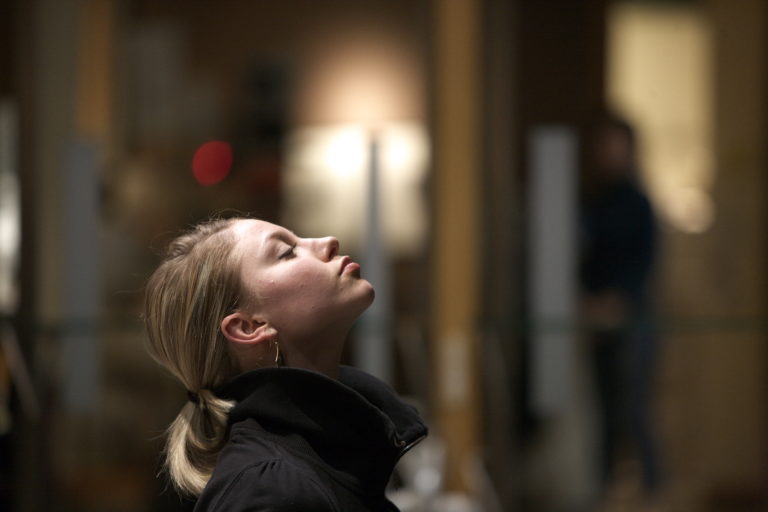
A woman meditates in a public space. Image by Minoru Nitta/Flickr (CC BY-NC-SA 2.0)..
The Potential in the Pregnant Pause
Last week I heard Tony Fadell, the creator of the iPod, and more recently, the smart thermostat Nest, speak about the principles that inform his design practice at the annual TED Conference.
Here’s what stuck with me most: he said that designers have to resist habituation in order to be transcendentally successful. They have to build in a pregnant pause and ask themselves questions about the status quo. They have to have beginner’s minds. They have to wonder, as they reach for their toothbrush and toothpaste: Is this the best shape for a container filled with paste? Is this the best material for bristles? Is this the right sized handle?
In short, a designer has to constantly resist settling for that old fallback of exhausted parents and irritated bosses everywhere: “Because we’ve always done it this way.”
I would take his important point a step further. I don’t think it’s just great designers that have an awareness of how their own habits dull their capacity to be creative, to invent, to expect more. I would argue that it’s great humans that do. One of my favorite mantras in the Buddhist tradition is, “May I see what I do. May I do it differently. May I make this a way of life.”
I say it often. Because, to be quite frank, I sometimes get really sick of myself. I get sick of my anxiety. I get sick of my automatic thoughts. I get sick of my “way.”
Of course I try to be gentle with my tired self; we all have a way of being in the world that makes us feel safe. Habits are part of what makes our lives livable. In the chaos of contemporary life, we crave the easily ordered, the familiar, the given. The things we do over and over again, the things that we don’t have to orchestrate or anticipate or invent, are like welcome exhales.
For me and for anyone who does some form of creative work, habits can be creative life rafts. My words drown in this overwhelmed life without them — my cup of coffee set here, my notebook with my pen on it here, the Wi-Fi shut off, the blank page and that blinking cursor egging me on.
When we get too attached to these habits, we risk losing our sense of wonder and our potential for the catalytic experience. When we get too comfortable, we risk falling asleep on the job — the job being living an awake life.
So it has me thinking: what are the habits that I need to or, better yet, want to shed? What are the habits filled with pleasure, the ones that make me feel grounded and capable of diving back into the fray of my busy life; in contrast, what are the habits that dull me? What are the habits that have gotten me here but won’t get me there?
Certainly my tendency to pull my cell phone out of my pocket and check my email or Instagram account during any moment of idleness is a habit that’s best shed. I gained inspiration for this one, as of late, while following WYNC’s fascinating Bored & Brilliant; participants attempted to resurrect boredom and all its wonderful byproducts by committing to cutting the umbilical chord with their cell phones.
I also want to spend more meals doing nothing but, well, eating. Innovation isn’t the only thing murdered by habitual multi-tasking like this. Pleasure is too. Habit sometimes dulls the senses and strips us of the surprises that come with noticing. I want to actually taste what I’m eating more of the time. I want to marvel at how it arrived on my plate. I want to taste the gratitude.
My biggest ambitions to resist habituation are rooted in my relationships. I want to be less dutiful. I want to pause before I get busy anticipating everyone else’s needs and making sure that no one suffers or fights. My wiser self knows that both can lead to transformation. I want to take up more space in some relationships and less space in others. I want to spend less time on guilt and more on joy. I want to choose my choices. I want to depersonalize. I want to say it plain.
What about you?

Share your reflection